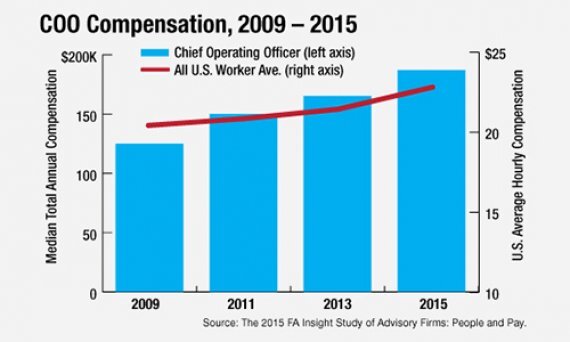
Compensation Report: Who's in the Money?
The recently released study finds that for the great majority of industry positions compensation growth exceeded average U.S. pay growth over the 2009-2015 period. A more rapid rise in advisory firm revenue relative to compensation levels, however, has helped to increase profits and counter any squeeze on margins due to rising labor costs
The following slides show trends in annual cash compensation for four common advisory firm positions over the past six years. Two of these are key advisory positions---lead advisor and associate advisor. Two are increasingly important non-advisory positionschief operating officer and office manager.
Scroll through or click here to view this content in a single-page version.

Lead Advisor
Over the 2009-2015 period lead advisor compensation increased at a compound annual growth rate of 2.6%. Compensation growth was higher than the increase of average pay for all U.S. workers but typical relative to other advisory firm positions. In 2015, only the CEO and Chief Investment Officer positions had a higher level of median compensation.

Associate Advisor
Associate advisor compensation grew at a compound annual growth rate of 2.0% during the 2009-2015 period, slightly above the U.S. average. Excepting a large jump in median pay for 2011, compensation growth for the position has been consistent but moderate.

Chief Operating Officer
As the typical advisory firm continues to increase in size, demand and compensation for COOs has increased accordingly. COO compensation grew more rapidly over the last six years than for any other industry position. Median COO compensation increased at an annual rate of nearly 7% during the 20092015 period, more than double compensation growth for lead advisors.

Office Manager
Positions such as office manager are growing in value as appreciation grows for the role that non-advisory roles can play in boosting the productivity of advisors and the firm. Few positions have experienced stronger compensation growth than the office manager. Over the 2009-2015 period compensation has increased at a compound annual growth rate of 3.9%, with particularly strong growth in the last four years.






